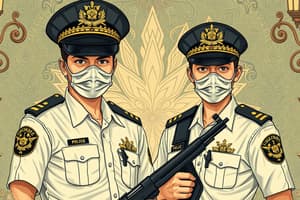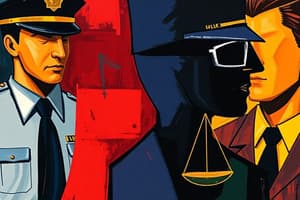Podcast
Questions and Answers
What is a law enforcement officer's duty when they witness another officer committing an offense or treating a community member with disrespect?
What is a law enforcement officer's duty when they witness another officer committing an offense or treating a community member with disrespect?
- To ignore the situation and avoid getting involved
- To intervene and stop the behavior (correct)
- To report the incident to their supervisor
- To talk to the officer privately about their behavior
Why is it important for law enforcement officers to practice ethical behavior even when off duty?
Why is it important for law enforcement officers to practice ethical behavior even when off duty?
- Because they are always on call
- Because their conduct reflects back onto every other law enforcement officer (correct)
- Because they have more power than civilians
- Because they are only paid to work on duty hours
What can influence a law enforcement officer's response to a problem?
What can influence a law enforcement officer's response to a problem?
- Only their fellow officers' attitudes
- Only their personal life experiences
- Only the Law Enforcement Code of Ethics
- Their fellow officers' attitudes, their personal life experiences, and their view of their role (correct)
Why is it important for law enforcement officers to find positive role models early in their career?
Why is it important for law enforcement officers to find positive role models early in their career?
What happens when a law enforcement officer abandons their ethical principles?
What happens when a law enforcement officer abandons their ethical principles?
What provides specific principles for law enforcement officers to follow?
What provides specific principles for law enforcement officers to follow?
Why is it important for law enforcement officers to maintain high ethical standards?
Why is it important for law enforcement officers to maintain high ethical standards?
What can personal life challenges, such as financial or legal troubles, lead a law enforcement officer to consider?
What can personal life challenges, such as financial or legal troubles, lead a law enforcement officer to consider?
What is the primary responsibility of law enforcement agencies in the United States?
What is the primary responsibility of law enforcement agencies in the United States?
Which level of law enforcement agency enforces ordinances and state laws within the municipality?
Which level of law enforcement agency enforces ordinances and state laws within the municipality?
What is the primary function of a county jail?
What is the primary function of a county jail?
According to the Florida Statutes, what is the definition of a juvenile?
According to the Florida Statutes, what is the definition of a juvenile?
What is the primary role of federal law enforcement agencies?
What is the primary role of federal law enforcement agencies?
What is the primary function of juvenile assessment and detention centers?
What is the primary function of juvenile assessment and detention centers?
Which of the following is an example of a state law enforcement agency?
Which of the following is an example of a state law enforcement agency?
What is likely causing the change in Officer Jones' behavior after responding to a residential fire?
What is likely causing the change in Officer Jones' behavior after responding to a residential fire?
What is the primary function of the fight-flight-freeze response?
What is the primary function of the fight-flight-freeze response?
What is the primary role of corrections?
What is the primary role of corrections?
What is a characteristic of stress?
What is a characteristic of stress?
What is the 'freeze' response in the fight-flight-freeze response?
What is the 'freeze' response in the fight-flight-freeze response?
What is a key aspect of stress management for law enforcement officers?
What is a key aspect of stress management for law enforcement officers?
What type of situations may a law enforcement officer regularly find themselves in?
What type of situations may a law enforcement officer regularly find themselves in?
What can negative stress lead to in a law enforcement officer?
What can negative stress lead to in a law enforcement officer?
What is the purpose of recognizing stress in law enforcement officers?
What is the purpose of recognizing stress in law enforcement officers?
What is secondary trauma also known as?
What is secondary trauma also known as?
What is compassion fatigue a result of?
What is compassion fatigue a result of?
Why do law enforcement officers often neglect their mental health?
Why do law enforcement officers often neglect their mental health?
What is the result of experiencing secondary trauma?
What is the result of experiencing secondary trauma?
What can law enforcement officers do to prioritize their mental health?
What can law enforcement officers do to prioritize their mental health?
What can be a consequence of neglecting mental health?
What can be a consequence of neglecting mental health?
What should law enforcement officers recognize about mental health?
What should law enforcement officers recognize about mental health?
What is a potential coping mechanism for an officer with PTSD?
What is a potential coping mechanism for an officer with PTSD?
Why do law enforcement officers fear seeking help for mental health issues?
Why do law enforcement officers fear seeking help for mental health issues?
Which of the following is a symptom of PTSD?
Which of the following is a symptom of PTSD?
What is a common consequence of hypervigilance in law enforcement officers?
What is a common consequence of hypervigilance in law enforcement officers?
What is a common indicator of PTSD in law enforcement officers?
What is a common indicator of PTSD in law enforcement officers?
What is a potential consequence of repeated exposure to traumatic stress?
What is a potential consequence of repeated exposure to traumatic stress?
What is the role of stress hormones in the body?
What is the role of stress hormones in the body?
What should an officer do when they are impacted by traumatic stress?
What should an officer do when they are impacted by traumatic stress?
Why is it important for law enforcement officers to understand the impact of traumatic stress on their body?
Why is it important for law enforcement officers to understand the impact of traumatic stress on their body?
Flashcards are hidden until you start studying
Study Notes
Law Enforcement Agencies
- The US has four levels of law enforcement agencies: local or municipal, county, state, and federal.
- Each level is responsible for enforcing laws within its jurisdiction.
- Local or municipal law enforcement agencies enforce ordinances and state laws within the jurisdiction.
- County law enforcement agencies enforce county ordinances and state laws, oversee county jails, and handle civil processing.
- State law enforcement agencies enforce state laws within the state.
- Federal law enforcement agencies enforce federal laws across state lines and within the states.
Corrections
- County jails: facilities where arrestees go through booking procedures, await trial, and serve a year or less detention.
- Juvenile assessment/detention centers: process and detain juvenile arrestees.
- A juvenile is defined as any person younger than 18.
Ethical Decision-Making
- Law enforcement officers have a duty to intervene if they see another officer committing an offense, disrespecting a community member, or engaging in unethical behavior.
- Ethical behavior is expected of law enforcement officers both on and off duty.
- Influences on ethical decision-making include fellow officers, personal life, and community expectations.
Stress and Officer Wellness
- Stress can be physical or emotional reactions to an event or situation.
- The three primary responses to stress are: fight, flight, and freeze.
- Negative stress can slow reaction time, make you question your decisions, or cloud your judgment.
- Post-traumatic stress disorder (PTSD) symptoms include irritable or aggressive behavior, reckless or self-destructive behavior, problems with concentration, and difficulty sleeping.
- PTSD can also lead to depression, anxiety, flashbacks, and recurring nightmares.
- Traumatic stress has medical consequences, including increased risk of illness, anxiety, and drug and alcohol addiction.
Managing Mental Health
- Law enforcement officers may experience secondary trauma and compassion fatigue.
- Secondary trauma occurs when a person is exposed to the trauma of others and develops physical or mental impacts.
- Compassion fatigue is the emotional exhaustion that comes from helping others on a long-term basis.
- Awareness of these possible complications is important for career longevity.
- Mental health is as important as physical health, and seeking professional help is confidential.
Studying That Suits You
Use AI to generate personalized quizzes and flashcards to suit your learning preferences.




